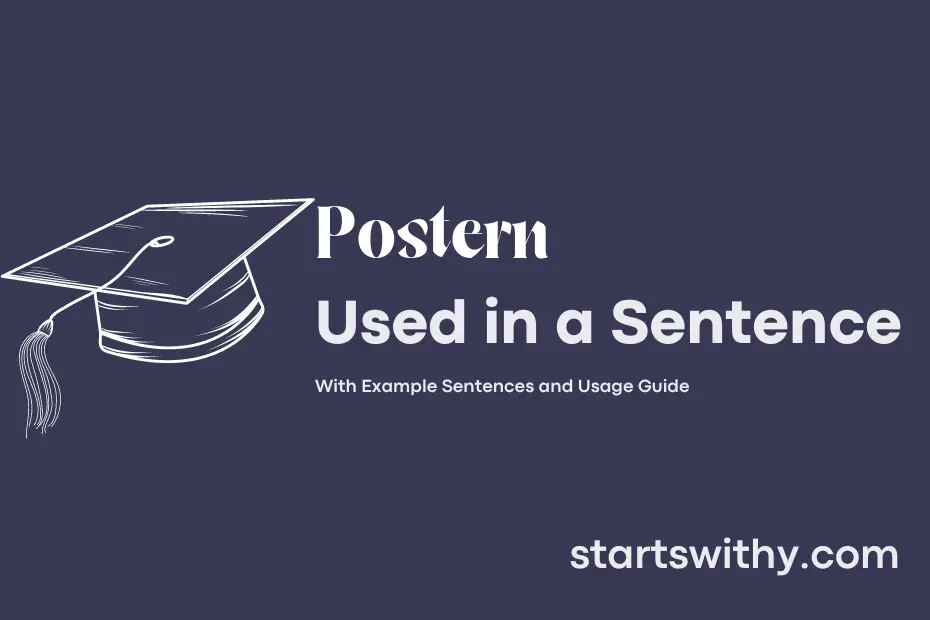Have you ever heard the word “postern” and wondered what it means? A postern is a small, often hidden or secondary entrance or gate, typically found in the back or side of a building.
In literature, a postern can symbolize secrecy, escape, or an alternative route. The word “postern” is not commonly used in everyday language, but it can evoke a sense of mystery and intrigue when encountered in stories or poems.
7 Examples Of Postern Used In a Sentence For Kids
- The postern is a small door at the back of the palace.
- The squirrel ran through the postern to hide in the garden.
- The key to the secret garden is hidden near the postern.
- Princess Ella sneaked out of the castle through the postern.
- The wise old owl perched on the postern to keep a lookout.
- The elves built a tiny house by the postern for their garden tools.
- The magical fairy queen appeared from behind the postern with a wave of her wand.
14 Sentences with Postern Examples
- After finishing their classes, the students gathered near the postern for a quick chat before heading home.
- The students found a quiet spot near the postern to prepare for their upcoming exams.
- An impromptu study group formed near the postern as students shared notes and discussed their lectures.
- To avoid the crowded main entrance, the students decided to enter through the postern at the back of the building.
- The college library, located near the postern, was a popular spot for students to study and research.
- During lunch breaks, some students preferred to relax outdoors near the postern and enjoy the fresh air.
- The students were surprised to find a beautiful mural painted near the postern of the college building.
- As part of a college project, students were tasked with documenting the history and significance of the postern on campus.
- The college administration installed a new security camera near the postern to ensure the safety of students entering and exiting the building.
- A group of students organized a peaceful protest near the postern to raise awareness about an important issue on campus.
- The college held its annual talent show in the courtyard near the postern, attracting a large audience of students and faculty.
- Students eagerly lined up outside the postern on the first day of the semester to receive their new textbooks and schedule.
- A stray cat had made its home near the postern of the college building, becoming a beloved mascot among the students.
- The college students were surprised to discover a hidden garden near the postern that provided a peaceful escape from their busy academic lives.
How To Use Postern in Sentences?
Postern is a versatile tool that can be used to create sentences in various styles. To use Postern, begin by selecting a main word that you want to emphasize in your sentence. This main word will be surrounded by other words or phrases to complete the sentence. For example, “I went to the store” emphasizes the word “store” in the sentence.
To further enhance your sentence, you can add adjectives before the main word to provide more detail. For instance, “I went to the convenient store” adds more information about the type of store being visited. Additionally, you can include adverbs after the main word to modify the action being described. For example, “I went to the store quickly” explains how the action of going to the store took place.
You can also experiment with different sentence structures using Postern. For example, you can create a sentence where the main word is at the beginning, in the middle, or at the end of the sentence. This flexibility allows you to generate a wide range of sentences to suit your needs.
By practicing with Postern, you can improve your sentence construction skills and create sentences that are engaging and effective. Experiment with different words, phrases, and sentence structures to see what works best for your writing style.
Conclusion
In summary, the sentences with the keyword “postern” exemplify its use in literature and historical contexts. These sentences illustrate how a postern gate can serve as a discreet entrance or exit, often in fortified structures like castles. They showcase the versatility of the term, capturing its nuanced meaning of a secondary, often hidden, passage for ingress or egress.
By analyzing sentences incorporating “postern,” we gain insight into the significance of these smaller entrances in architecture and storytelling. The varied examples demonstrate how authors have creatively employed the word to evoke a sense of mystery, secretiveness, or historical authenticity in their writing. Overall, the sentences with “postern” showcase the word’s rich literary history and its ability to conjure up images of hidden pathways and clandestine activities in the minds of readers.



